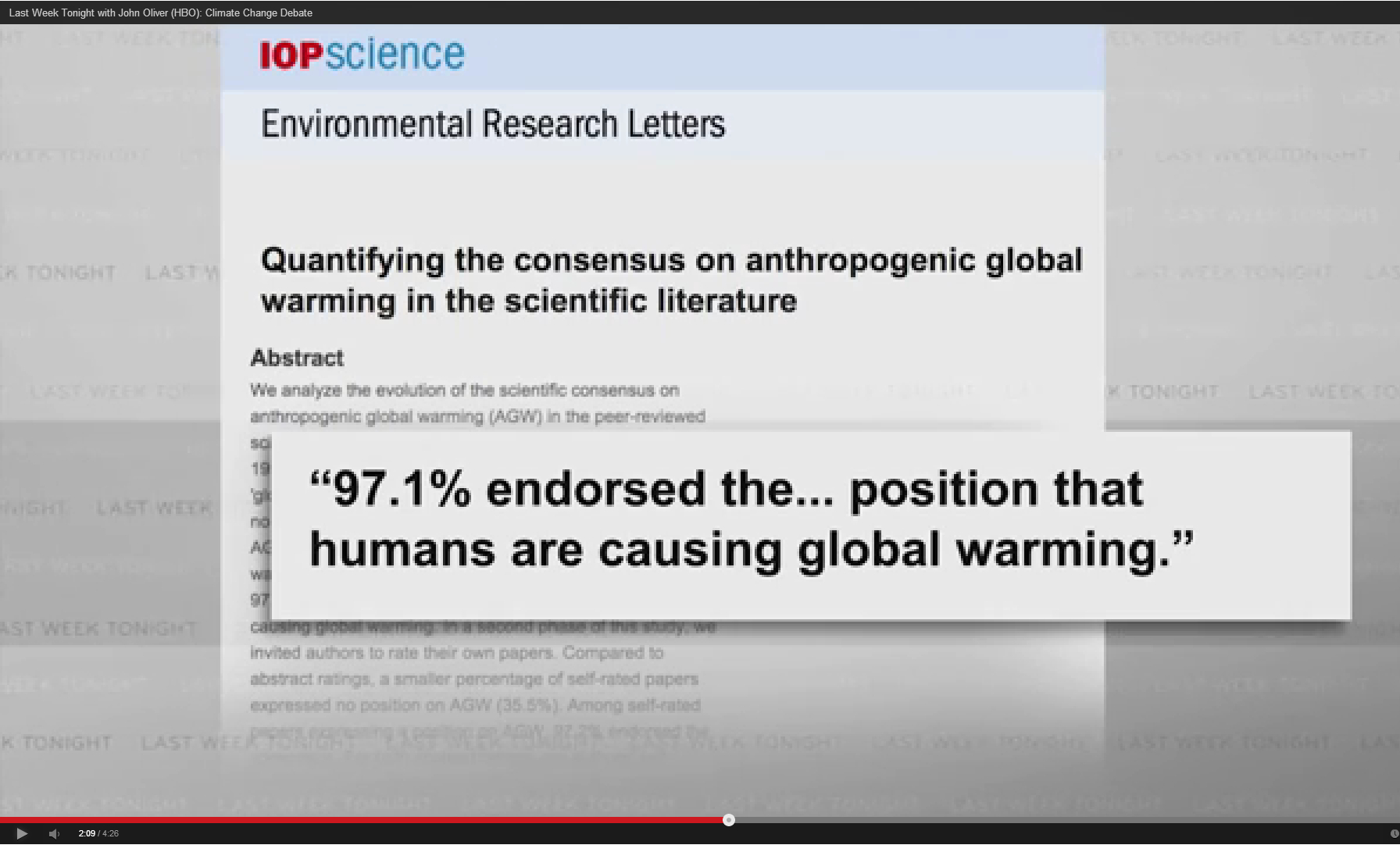
In a hilarious and insightful comedy skit on HBO's show, Last Week Tonight, John Oliver cuts straight to the heart of the scientific consensus on global warming and features the Skeptical Science research paper on this subject - see below. Oh, and be warned, make sure you're not drinking anything hot before clicking on the video.
A research paper by the Skeptical Science team - Cook et al (2013) - Quantifying the consensus on anthropogenic global warming in the scientific literature - was an assessment of the level of consensus on the matter of human-caused global warming in the peer-reviewed scientific literature. Based on the abstracts (a short summary at the beginning of a research paper) of almost 12,000 papers, what we found was that, of those that expressed a view as to the cause, 97.1% of the scientific literature indicated that human activity was largely responsible for global warming. We also invited the authors of the papers we assessed (expressing a view as to cause) to rate their own papers (not abstracts) and based on those ratings it was determined that 97.2% of the author's papers attributed global warming to human activity.
This isn't really that much of a surprise to people familiar with climate science, for example Doran & Zimmerman (2009) found 97.4% endorsement amongst those most active in climate research, and Anderegg et al (2010) found a figure of 97-98%. Of course it's easy to understand why this is so, multiple lines of evidence point the finger at fossil fuel emissions for the increased (enhanced) Greenhouse Effect which is warming the Earth. And yes, the Earth is still warming despite wishful thinking to the contrary - accumulating heat long-term at the rate of 4 Hiroshimas bombs per second. Most of this heat is going into the oceans, but the atmosphere is still warming too. Land-based ice sheets are disintegrating and sea levels are rising because of this, and because warmer ocean waters expand as well. The list goes on and on, but you get the picture. The wealth of accumulated scientific evidence is immense and the observations are gobsmackingly obvious.
Despite the 97% scientific consensus, all this scientific research implicating human disruption of the climate system, and all the observations that support it, the general public in most western nations is mightily confused about global warming and about the level of scientific consensus. For example, a US survey, Dew (2012), found 55% of those people polled either disagreed that there was a scientific consensus, or didn't know. This is important because research also shows that awareness of the scientific consensus is a necessary element in support for policy to address global warming (Ding et al [2011]). Clearly this doesn't mean that public knowledge of the genuine scientific consensus will by itself overcome inaction, but it is likely to remove one significant roadblock.
As one might expect, the primary source of misinformation in the public sphere stems from the mainstream media, and a common method of confusing the public are staged debates. This is where they get two people (sometimes more) from each side to argue it out in front of an audience or camera. As far as global warming is concerned, however, the scientific evidence and scientific consensus is heavily skewed toward the climate science community. By having a balanced number of participants in these debates the media is perpetrating a false balance. These are not two sides of equal scientific merit, nor is a typical public audience sufficiently schooled in climate science to be able to distinguish fact from fiction. This whole practice creates the false impression that there is genuine scientific debate where none exists.
Now a truly balanced debate on the topic of global warming would involve a lot more people on the side of climate science, 97% in fact. Which is where John Oliver steps in. And note the screen capture at two minutes into the video.

Posted by Rob Painting on Tuesday, 13 May, 2014
 |
The Skeptical Science website by Skeptical Science is licensed under a Creative Commons Attribution 3.0 Unported License. |